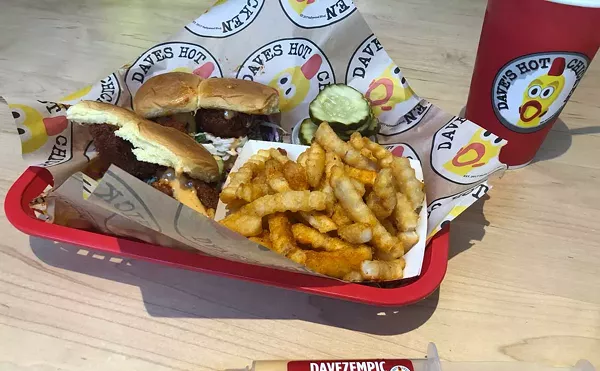John Hoffman brags about eating Dumpster dinners served on dived place settings by the light of similarly obtained candlesticks.
Through Dumpster diving, Hoffman gets everything needed for a middle-class lifestyle from other people's rubbish.
"The United States is full of idiots discarding perfectly good material wealth," says Hoffman, who furnished his home from trash cans.
His book, The Art & Science of Dumpster Diving (Loompanics Unlimited, $14.95, 152 pp.), explains how.
He includes everything from proper attire (gloves), to equipment (a stick) and techniques (only put the top half of your body in the Dumpster). His rule of thumb for food: "If it smells bad, forget it."
This is all done with an iconoclastic motive. Hoffman peddles his book -- and a how-to video -- to make the point that this country overconsumes and overpackages. The surplus bulges from Dumpsters, he contends.
But in American cities, Detroit included, people Dumpster dive for a more singular purpose: to eat. In some cities, such as Seattle, traffic is so heavy in back alleys that padlocking trash cans is required, and the act of diving is a misdemeanor.
Things are not as bad here, though Detroit is poorer. According to Dale Hardeman, a Detroit ordinance clerk, this city does not have a similar law. Usually, he says, Dumpster divers are left alone.
"However," Hardeman warns, "if there's an owner complaint, disorderly conduct charges could be brought against the violator."
James, who asked that his last name not be used, has been homeless in Detroit's Cass Corridor since 1991. He agrees that Dumpsters are filled with treasures, especially around Wayne State University, which he identified as being "the most lucrative."
"Everything I'm wearing some student threw out," he says, indicating his fairly fashionable attire.
However, James, a 52-year-old African American who has arthritis and walks with a cane, expresses a fear of eating Dumpster-dived food.
"In my condition," he says, "I can't risk food poisoning."
James says he knows many homeless people who avail themselves of food discarded from inner-city supermarkets, fast food outlets, and hospitals. And, he admits, during the summer months he and others make forays to the Eastern Market where slightly bruised -- but completely edible -- fruits and vegetables are routinely discarded. He says these are usually consumed on the spot.
It's hard to determine exactly how prevalent Dumpster diving is. Detroit's Neighborhood Service Organization estimates that there are slightly more than 5,000 persons homeless on a daily basis in the city, and approximately 25,000 who become homeless for at least part of the year. To meet the needs of this population, a network of soup kitchens serves thousands of meals a day, to the extent that Dumpster diving would appear unnecessary.
Still, the practice is common enough that the Burger King at Fort and Trumbull built a large concrete barrier around its refuse cans to keep its garbage secure. Fresh food is often discarded there soon after cooking, due to franchise rules that prohibit keeping it beyond a prescribed time. Master diver Hoffman reports numerous cases where friendly clerks will turn over bags of burgers and fries to waiting hands.
There's clearly plenty of treasure to go around -- it's just misplaced. Hoffman gleefully urges his readers to harvest the discarded bounty in America's trash.
John Hoffman's video, "The Ultimate Dive," is $20 from Suzanne Girot, PO Box 269, Felton, CA 95018.
Food View:
Earl Hornig, 58
Dairy farmer, Manchester
"Over the last 15 years, Washtenaw County has lost 60,000 acres of farmland to development."
"Those of us who want to continue farming in this county are faced with pressure from increased traffic and increased nuisance complaints about sound agricultural practices ... As the number of farmers continues to dwindle, we will see more farm-related businesses close their doors, which means a loss of local revenue and local jobs. For those farmers who remain, the additional cost of doing business outside the county will make them even less competitive economically. The sad fact is, it will be harder and harder to continue farming."






